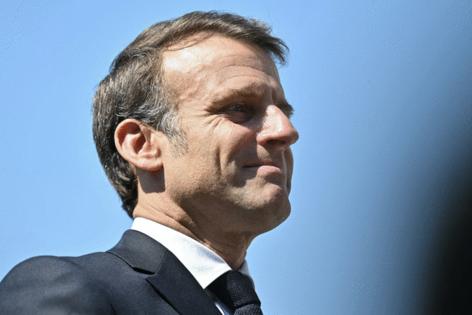Macron seeks to end French chaos with new premier by Friday
Published in News & Features
PARIS — French President Emmanuel Macron said he’ll name a new prime minister by Friday evening, having for the time being avoided the need to call a snap election that would have deepened the political chaos in France.
Outgoing Premier Sebastien Lecornu, who was tasked by Macron on Monday to negotiate with the political groups in the National Assembly, said sufficient progress had been made to allow work to begin on forming a new Cabinet.
“There are possibilities for a compromise in parliament,” Lecornu said on France 2 television Wednesday night. Macron’s office confirmed shortly after that he would name a new prime minister in the next 48 hours.
French stocks recouped their losses from Monday when Lecornu’s resignation triggered a selloff as investors braced for the possibility of snap elections. Paris’ CAC 40 blue chip benchmark gained as much as 0.4%, reaching levels hit on Oct. 3.
The comments from Macron and Lecornu offer a modicum of encouragement that France’s political system can recover some stability after seeing three prime ministers pushed out of office since December.
Nevertheless, the path forward for any new administration is littered with hazards since parliament is split between three deeply antagonistic blocs and all parties have an incentive to position themselves for a crucial presidential election due in less than two years, rather than make compromises.
Failure by the new prime minister to form a Cabinet would mean that Macron would either have to call a parliamentary election, appoint yet another prime minister or resign — something he’s previously rejected.
Lecornu said whoever Macron chooses as the next premier, the person must have no ambitions to run for president in 2027. “The elephant in the room is the presidential election,” he said.
Far-right leader Marine Le Pen, who would be one of the front-runners for 2027 if she’s cleared by the courts to run, has vowed that she will try to oust any new administration in a bid to force fresh parliamentary elections, which could strengthen her hand.
The relief was also palpable across fixed-income markets with the spread between the 10-year yield of French and German bonds narrowing to below 82 basis points after hitting its highest level since January on Monday.
“A shaky deal is better than snap elections and so at the moment, no news is good news,” said Claudia Panseri, chief investment officer for France at UBS Wealth Management. “It’s the least-worst scenario.”
The political chaos, however, has taken a toll on the president’s image. Macron’s approval rating fell 3 points to 14%, the lowest level since he took office in 2017, according to a poll conducted Oct. 7-8 by Elabe for Les Echos.
Former Prime Minister Elisabeth Borne signaled the chances of agreement were improving when she said late Tuesday that she was open to suspending a controversial 2023 law that raised the minimum retirement age to 64 from 62. Borne said that such a move was worth considering if that was what was required to create stability for the country.
Lecornu said that it would be up to the next government, in coordination with parliament, to find a way of dealing with the pensions issue that he acknowledged is seen as a “democratic wound” by French people.
“I told the president that it will be necessary to find a path for a debate on the pension reform,” Lecornu said.
Socialist spokesman Arthur Delaporte said that any new prime minister would need to represent a change in policy from the previous governments, particularly when it comes to the issue of rescinding the pension law.
“People are just bored with the political mess and the only path to stability is political change,” Delaport said in an interview with Bloomberg Television Thursday . “The cost of political instability is much higher than the cost of the suspension of the pension reform.”
Still, the outgoing premier also said suspending the gradual increase in the retirement age would cost “no less than €3 billion ($3.5 billion)” by 2027, depending on which elements are put on hold.
Lecornu also reiterated that France has some margin for less ambitious budget cuts than he’d previously planned, so long as the gap still falls below 5% of economic output next year. He’d earlier put the goal at 4.7%.
That opens up more space to negotiate with Socialists who have demanded a less austere fiscal policy than the one planned by Lecornu’s predecessor, Francois Bayrou, who had targeted a 2026 deficit of 4.6%.
“After years of Macronist denial, Sebastien Lecornu has recognized that the Left was right,” Boris Vallaud, head of the Socialist group in the National Assembly, said on social media. “It’s now necessary to draw the consequences of this and let the Left govern.”
Lecornu urged lawmakers to begin debating next year’s fiscal plan as soon as possible. In theory, the government must submit a bill to parliament by Oct. 13 to allow for 70 days of deliberation prescribed by the French constitution.
“Everyone told me that we can’t take the risk of not having a budget by Dec. 31 because the consequences for France and the French people would be absolutely dramatic,” Lecornu said.
Finding a premier to deliver the deal will be tough. The Socialists are demanding someone from their side of the aisle, but the center right say they would oppose that and the far right and far left say they will vote to topple any prime minister Macron picks.
“I’m censuring everything, this needs to stop,” Le Pen said earlier Wednesday, referring to voting against the new government. “The joke’s lasted long enough.”
--------
—With assistance from James Regan, Julien Ponthus and Lizzy Burden.
©2025 Bloomberg L.P. Visit bloomberg.com. Distributed by Tribune Content Agency, LLC.







Comments